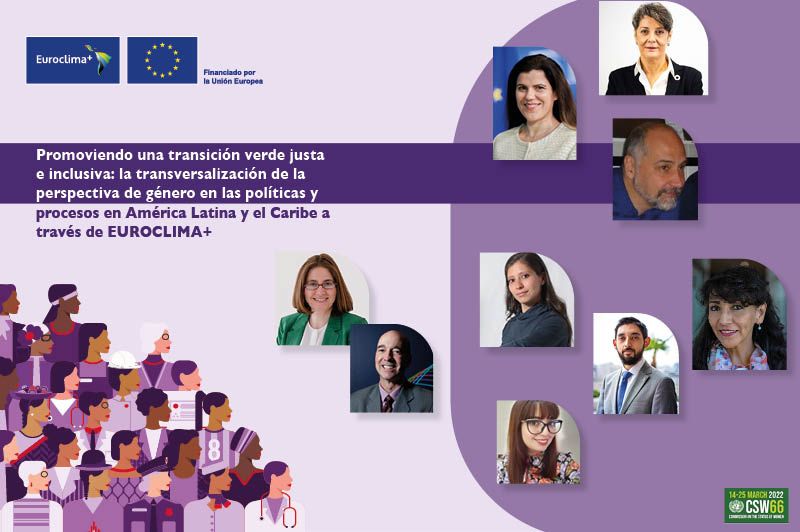In the framework of the 66th period of sessions of the Commission on the Status of Women, EUROCLIMA+ presented an event for sharing experiences from diverse projects.
Under the title: “Promoting a green, just and inclusive transition: gender mainstreaming in policies and processes in Latin America and the Caribbean through EUROCLIMA+”, this European Union cooperation programme held a virtual event focused on the following objectives:
- Share best practices for gender mainstreaming in climate action in the Latin American and Caribbean region based on initiatives promoted by EUROCLIMA+.
- Identify barriers to carrying out such projects and strategies for overcoming them in order to implement climate actions with a gender perspective.
- Exchange reflections on key and inspiring elements of these initiatives to facilitate their incorporation into public policies.
This meeting took place within the framework of the 66th session of the Commission on the Status of Women (CSW66), and was structured in two segments: a policy section with representatives of the European Union, cooperation agencies and United Nations agencies, who framed the issue, followed by a discussion between government representatives and Latin American specialists.
Translating international mandates into climate action
Commitment to gender equality
Diana Montero Melis, Deputy Head of Unit South America and Regional Operations, Directorate General for International Partnerships, European Union emphasised the European Union's commitment to gender equality, by seeking a more egalitarian Europe, in which all citizens are free to follow their chosen path in life. This ambition permeates its foreign policy, reiterating its commitment to gender equality as a guiding principle through the Plan de Action Plan for Gender Eguality and the Empowerment of Women in Foreign Action (GAP III).
"Specifically in Latin America and the Caribbean, in the European Union we have EUROCLIMA+ as a flagship programme for regional cooperation on environmental sustainability and climate change, which has also provided technical support with respect to the gender perspective for many years (...). Both through this Programme and with the Latin American governments we work with, we have agreed to reiterate the commitment to gender equality, recognising equality as a cross-cutting issue necessary for sustainable development".
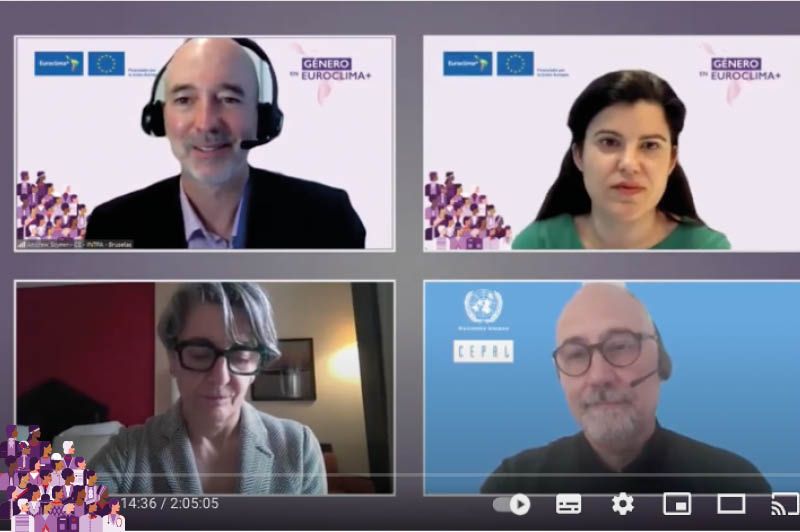
For his part, Santiago Lorenzo, Head of the Climate Change Unit, Sustainable Development and Human Settlements Division of ECLAC, stressed that "in the innovative Regional Meeting on Climate Change and Gender Equality, held in September 2021, which was organized by the government of Chile, in its capacity as COP25 Presidency and which had the contribution of the European Union through its EUROCLIMA+ and EUROSOCIAL Programmes and the technical support of ECLAC, best practices, challenges and strategies for mainstreaming the gender perspective in national climate change plans and policies were exchanged, and various regional work processes were triggered, which we welcomed and want to continue to support".
And finally within this first segment, Anna Terrón Cusí, Director of the International and Ibero-American Foundation for Public Administration and Policies (FIIAPP), stressed the importance of gender equality for Spanish and European cooperation: "From the EUROCLIMA+ Programme, we support partner countries in their objectives to reduce such inequality by developing actions focused on incorporating the gender approach, as well as the inclusion of groups in vulnerable situations in their public policies on climate change".
In addition, the Director mentioned the “Encuentro Regional Meeting on Gender and Environment with the Ministries of Environment of Latin America”, which took place on 24 and 25 March 2022 and whose purpose was to support a regional network of gender and environment experts, in partnership with UNEP and together with the Ministry of Environment of Chile.
Conversation between specialists from the region
Supporting regional partnerships to advance climate action with a gender perspective
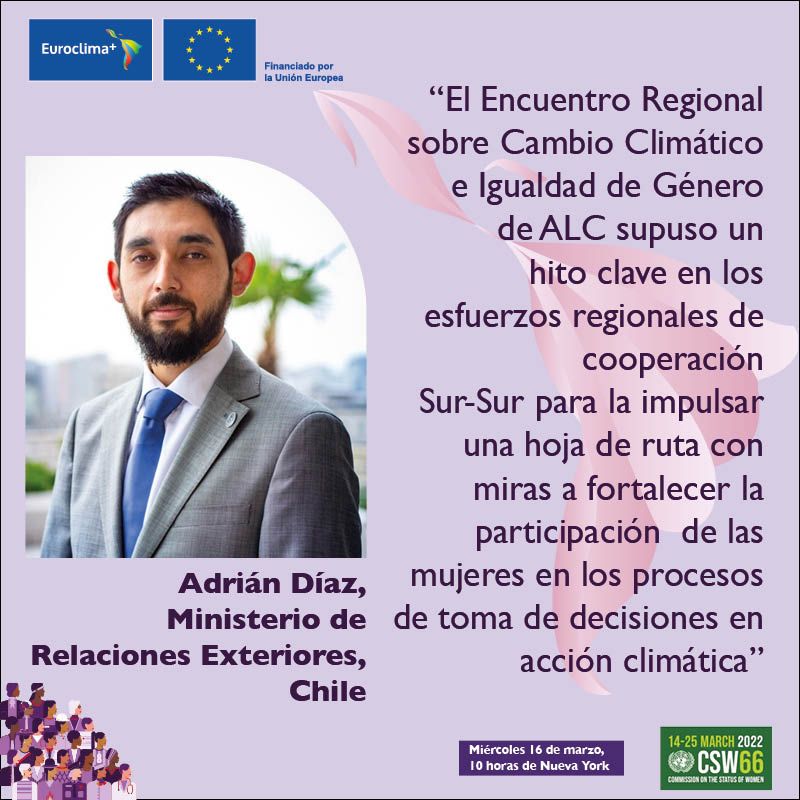
Adrián Díaz Benavides, National Focal Point for Gender and Climate Change (UNFCCC), Ministry of Foreign Affairs of Chile, shared how the Government of Chile, in its capacity as Presidency of COP 25, used the opportunity provided by the Presidency to resume the internal work being done to bring together the climate change and gender equality agendas and thus increase the capacities of national institutions to follow up on this issue.
Among these actions the organisation of the Regional Meeting on Climate Change and Gender Equality in September 2021 stood out, an event that allowed strengthening the capacities of LAC countries to manage the links between gender and climate change; identifying best practices and challenges related to gender mainstreaming in the formulation and implementation of national climate change policies, and laying the foundations for a future LAC Gender Equality and Climate Change Network for developing a roadmap.
The impacts of women's leadership on urban mobility projects at the municipal level
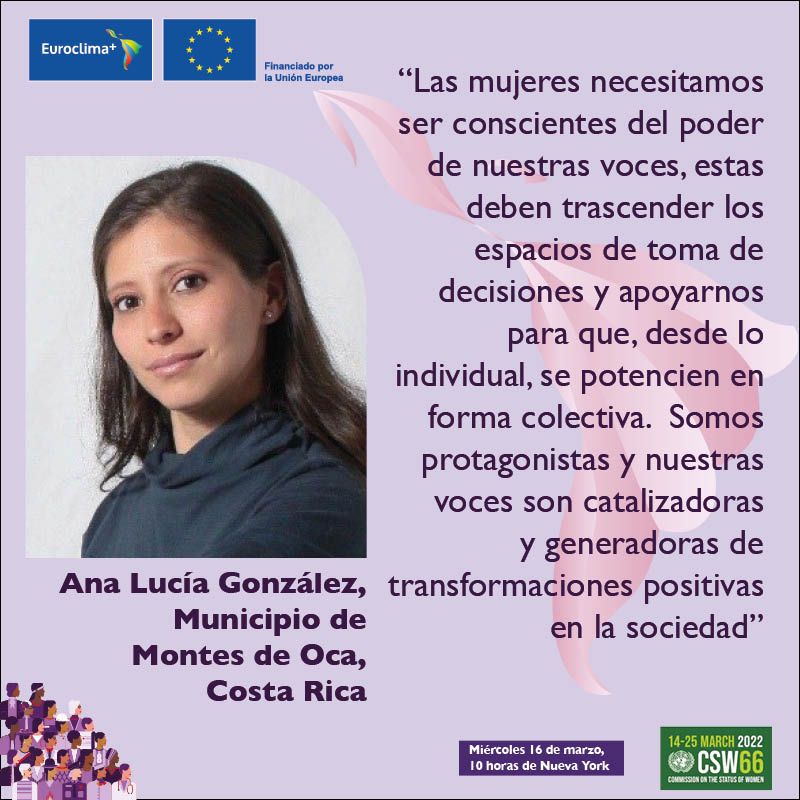
Ana Lucía González, Vice-Mayor of the Municipality of Montes de Oca, Costa Rica, emphasised how her municipality set the goal of developing strategies and projects where people take ownership of the public space and contribute in parallel to improving the socio-environmental qualities of the city and its inhabitants as part of its quest to generate a more sustainable city.
"Working for the common good through a participatory and multi-stakeholder process is one of the success factors of the “Project for the promotion and development of urban cycling in Montes de Oca and Curridabat”, which included a network of bicycle lanes to connect Montes de Oca with Curridabat", said the deputy mayor.
Thanks to women's participation in the project, their conception and implementation made it possible to build a stronger and broader vision of bicycle lanes. An example of this was the active participation of women in workshops such as the "Biciparque" concept, as well as the participation of women in the technical/engineering team, where they designed and supervised the technical aspects of the project, facilitating inter-institutional collaboration between different local communities and agencies.
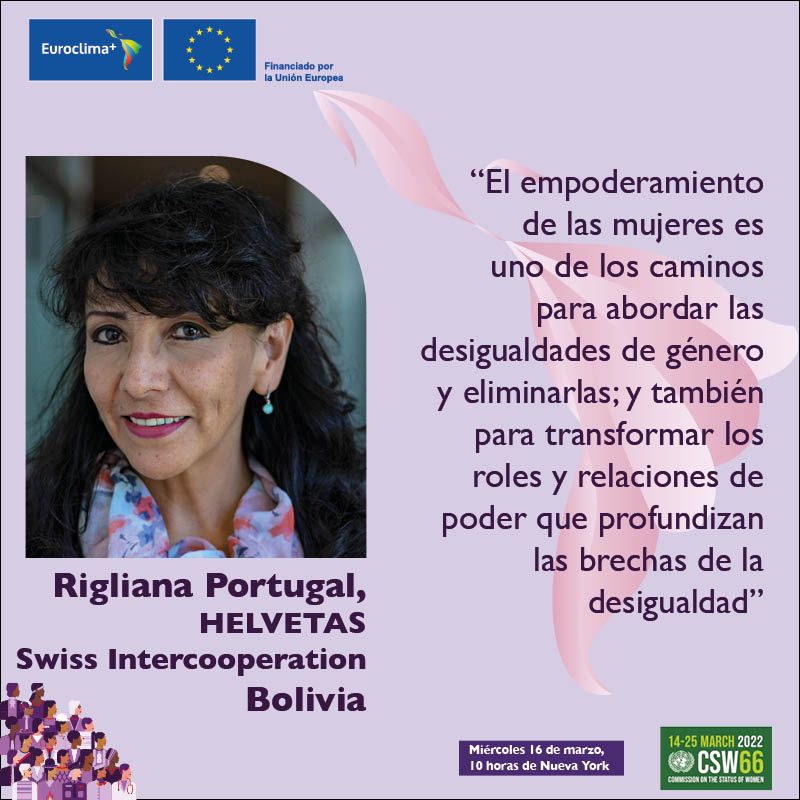
Benefits of the gender and intercultural approach in the Pachayatiña/Pachayachay project
Rigliana Portugal Escobar, Knowledge Management and Communication Specialist; and Gender Focal Point at HELVETAS Swiss Intercooperation Bolivia presented a project funded by the European Union entitled Project binational Pachayatiña/Pachayachay (the knowledge of weather and the knowledge of climate), which was developed in Aymara municipalities (Bolivia) and Quechua districts (Peru). The project recognised that in these localities women are clearly in charge of water, food and energy at the household level, but also in community spaces, a situation that generates greater responsibilities, which in the case of Bolivia, for example, are more acute due to male migration to other areas as a result of the drought and climate impacts that are currently being experienced. Furthermore, during the implementation of this project, the need to link academic and ancestral knowledge for the adaptation and mitigation of climate change was evident, thus reducing the impact of drought. Within this framework, work was done on the integration of the gender and intercultural approach, which also resulted in an intercultural climate service, with valuable contributions from women and men.
"During the project implementation period, the experiences and lessons learned have been fundamental for the dialogues between producers and authorities in Bolivia and Peru on sustainability-oriented actions. These have revealed a series of fundamental requirements for the creation of public policies, such as the use of gender analysis in the project cycle, communication for development and the active listening to communities in their diversity of gender, ethnicity and age, so that an instrument can be generated to guide investments at local, regional and national levels," the specialist emphasised.
The gender perspective as a tool for improving small-scale family farming in the central Ecuadorian Andes
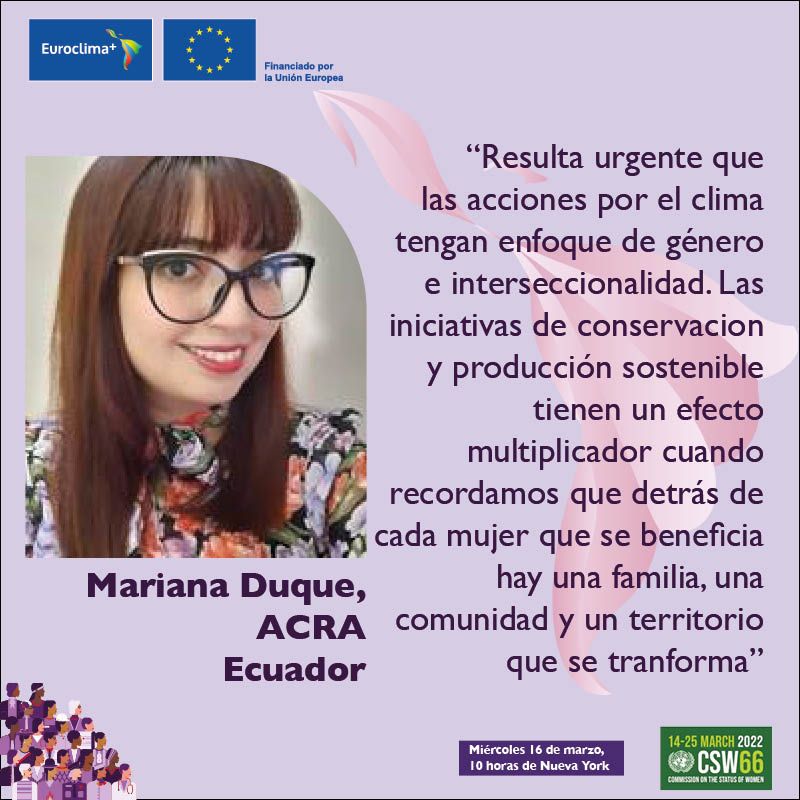
Mariana Duque, ACRA's Gender Specialist Consultant, presented the Andean Resilience project, which aimed to strengthen resilient value chains in milk production and family farming in the region.
As part of this project, a gender mainstreaming and capacity building process was carried out in 2021, which consisted of the implementation of training spaces and workshops on Gender and Climate Change in the intervention areas where the project is being developed, in collaboration with the Association of Family Agricultural Production and representatives of the Departmental Autonomous Governments.
These workshops aimed to sensitise farmers to the concepts and theoretical bases of gender equality and to identify gender gaps and corrective measures to achieve gender equality in the Farmers' Associations. The activities enabled farmers to identify their roles and time use in their families and communities. In addition, they were able to identify behaviours in terms of the differentiated access and control that people have over productive resources and productive chains.
About the experience exchanges
The experience exchanges during the discussion session made it possible to identify common elements that can ensure the replicability of these initiatives and their incorporation into public policies. Among them, the following were highlighted:
- Investing in capacity building to implement methodologies for gender-sensitive climate action.
- Strengthening the collection of sex-disaggregated data to inform climate change decision-making and policy design.
- The use of gender analysis as a tool for climate policy and action planning.
- The promotion of women's active participation to achieve their autonomy in order to address and recover from climate shocks.
This discussion made it possible to identify concrete examples of coordination for action between mechanisms for the advancement of women and ministries of environment, and to hear about the need to ensure budgeting for gender for these activities, as the latter comes mostly from international cooperation and not from national or local budgets.
These reflections and the examples presented are aligned with the priorities identified in the Declaration adopted by the Ministers and High Authorities of the National Machineries for the Advancement of the Women of Latin America and the Caribbean for the 66th sesion of the Commission on the Status of Women (CSW 66), which is an instrument that will guide the activity of these national mechanisms in the search for synergies to include and strengthen the treatment of gender equality in public policies on climate change.
The recording of the session is available on the Programme's YouTube channels in English and Espanish
About EUROCLIMA+
EUROCLIMA+ is a programme funded by the European Union and co-financed by the German federal government through the Federal Ministry for Economic Cooperation and Development (BMZ), as well as by the governments of France and Spain through the Ministry of Foreign Affairs, European Union and Cooperation.
The Programme's mission is to reduce the impact of climate change and its effects in 18 countries in Latin America and the Caribbean, promoting mitigation, adaptation, resilience and climate investment. It is implemented according to the "Spirit of Team Europe" under the synergistic work of seven agencies: the Spanish Agency for International Development Cooperation (AECID), the French Development Agency (AFD), the Economic Commission for Latin America and the Caribbean (ECLAC), Expertise France (EF), the International and Ibero-America Foundation for Administration and Public Policy (FIIAPP), the German Society for International Cooperation (GIZ) GmbH, and the UN Environment Programme (UNEP).

